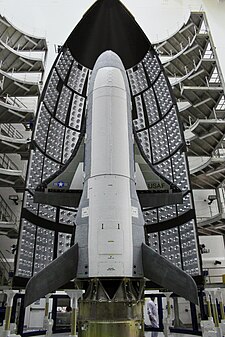Boeing X-37
| X-37 | |
|---|---|
 |
|
| The OTV-1 X-37B in April 2010, inside its payload fairing prior to launch | |
| Role | Unmanned spaceplane |
| National origin | United States |
| Manufacturer | Boeing Defense, Space & Security |
| First flight | 7 April 2006 (first drop test) |
| Introduction | 22 April 2010 (first spaceflight) |
| Status |
|
| Primary user |
|
| Number built |
|
| Developed from | Boeing X-40 |
The Boeing X-37, also known as the Orbital Test Vehicle (OTV), is a reusable unmanned spacecraft. It is boosted into space by a launch vehicle, then re-enters Earth's atmosphere and lands as a spaceplane. The X-37 is operated by the United States Air Force for orbital spaceflight missions intended to demonstrate reusable space technologies. It is a 120%-scaled derivative of the earlier Boeing X-40.
The X-37 began as a NASA project in 1999, before being transferred to the U.S. Department of Defense in 2004. It conducted its first flight as a drop test on 7 April 2006, at Edwards Air Force Base, California. The spaceplane's first orbital mission, USA-212, was launched on 22 April 2010 using an Atlas V rocket. Its successful return to Earth on 3 December 2010 was the first test of the vehicle's heat shield and hypersonic aerodynamic handling. A second X-37 was launched on 5 March 2011, with the mission designation USA-226; it returned to Earth on 16 June 2012. A third X-37 mission, USA-240, launched on 11 December 2012 and landed at Vandenberg AFB on 17 October 2014. The fourth X-37 mission, USA-261, launched on 20 May 2015 and is in progress.
In 1999, NASA selected Boeing Integrated Defense Systems to design and develop an orbital vehicle, built by the California branch of Boeing's Phantom Works. Over a four-year period, a total of $192 million was contributed to the project, with NASA contributing $109 million, the U.S. Air Force $16 million, and Boeing $67 million. In late 2002, a new $301-million contract was awarded to Boeing as part of NASA's Space Launch Initiative framework.
...
Wikipedia
